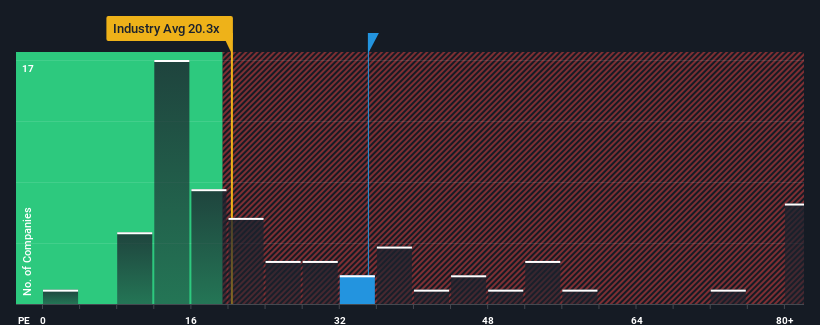- Taiwan
- /
- Electrical
- /
- TWSE:6409
Some Shareholders Feeling Restless Over Voltronic Power Technology Corp.'s (TWSE:6409) P/E Ratio
With a price-to-earnings (or "P/E") ratio of 35x Voltronic Power Technology Corp. (TWSE:6409) may be sending very bearish signals at the moment, given that almost half of all companies in Taiwan have P/E ratios under 21x and even P/E's lower than 15x are not unusual. Although, it's not wise to just take the P/E at face value as there may be an explanation why it's so lofty.
With only a limited decrease in earnings compared to most other companies of late, Voltronic Power Technology has been doing relatively well. It seems that many are expecting the comparatively superior earnings performance to persist, which has increased investors’ willingness to pay up for the stock. If not, then existing shareholders might be a little nervous about the viability of the share price, especially if earnings continue to dissolve.
View our latest analysis for Voltronic Power Technology

Does Growth Match The High P/E?
The only time you'd be truly comfortable seeing a P/E as steep as Voltronic Power Technology's is when the company's growth is on track to outshine the market decidedly.
Retrospectively, the last year delivered a frustrating 2.1% decrease to the company's bottom line. Even so, admirably EPS has lifted 68% in aggregate from three years ago, notwithstanding the last 12 months. So we can start by confirming that the company has generally done a very good job of growing earnings over that time, even though it had some hiccups along the way.
Looking ahead now, EPS is anticipated to slump, contracting by 0.3% during the coming year according to the four analysts following the company. That's not great when the rest of the market is expected to grow by 22%.
With this information, we find it concerning that Voltronic Power Technology is trading at a P/E higher than the market. Apparently many investors in the company reject the analyst cohort's pessimism and aren't willing to let go of their stock at any price. Only the boldest would assume these prices are sustainable as these declining earnings are likely to weigh heavily on the share price eventually.
What We Can Learn From Voltronic Power Technology's P/E?
Generally, our preference is to limit the use of the price-to-earnings ratio to establishing what the market thinks about the overall health of a company.
We've established that Voltronic Power Technology currently trades on a much higher than expected P/E for a company whose earnings are forecast to decline. When we see a poor outlook with earnings heading backwards, we suspect the share price is at risk of declining, sending the high P/E lower. Unless these conditions improve markedly, it's very challenging to accept these prices as being reasonable.
It is also worth noting that we have found 2 warning signs for Voltronic Power Technology that you need to take into consideration.
You might be able to find a better investment than Voltronic Power Technology. If you want a selection of possible candidates, check out this free list of interesting companies that trade on a low P/E (but have proven they can grow earnings).
New: Manage All Your Stock Portfolios in One Place
We've created the ultimate portfolio companion for stock investors, and it's free.
• Connect an unlimited number of Portfolios and see your total in one currency
• Be alerted to new Warning Signs or Risks via email or mobile
• Track the Fair Value of your stocks
Have feedback on this article? Concerned about the content? Get in touch with us directly. Alternatively, email editorial-team (at) simplywallst.com.
This article by Simply Wall St is general in nature. We provide commentary based on historical data and analyst forecasts only using an unbiased methodology and our articles are not intended to be financial advice. It does not constitute a recommendation to buy or sell any stock, and does not take account of your objectives, or your financial situation. We aim to bring you long-term focused analysis driven by fundamental data. Note that our analysis may not factor in the latest price-sensitive company announcements or qualitative material. Simply Wall St has no position in any stocks mentioned.
About TWSE:6409
Voltronic Power Technology
Manufactures and sells uninterruptible power systems (UPS) in Taiwan and China.
Flawless balance sheet with proven track record and pays a dividend.
Similar Companies
Market Insights
Community Narratives



